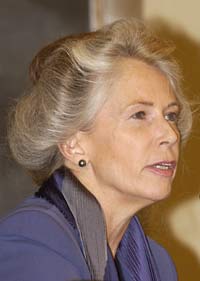Clapping and laughter erupted several times during the annual Academic Freedom Lecture Oct. 31 as U-M Prof. Catharine MacKinnon built upon her premise that academic freedom is both under- and overused.
During her talk titled, “From Powerlessness to Power: The Uses of Academic Freedom,” the Elizabeth A. Long Professor of Law said the concept of free expression of ideas is the ideal, and should lead to intellectual freedom, but is not what is being practiced.

“Many people who could and would most use it, seldom have it, and those who have it, seldom use it,” she said.
MacKinnon described what she called the orthodoxy of the academy, which she said prohibits true academic freedom. She said students are inhibited from expressing fresh thoughts because of the desire for a good grade. When graduates go to find a job in education, they are stifled by the need to impress a search committee, and what is perceived as radical thought, she said, has kept many bright scholars from being employed. Those fortunate to get a position, she said, then must worry about getting tenure.
“Once they have tenure, and have academic freedom, they could finally say what they really think, but a good many people by this point don’t even know how to think about anything other than what can be approved by the power, because that is all they have ever had any practice doing,” she said. “In other words, the deepest violations of academicfreedom happened before you can ever get it [tenure].”
The result of this stifling of academic freedom, MacKinnon said, is a loss of intellectual freedom.
While what she termed the conformity of institutions of higher education results in under-use of academic freedom, MacKinnon cited a number of situations in which it has been overused.
Using case law dating back to the 1990s, she said academic freedom has been an excuse for the use of sexual and racist language and activities in classrooms. Early on, the courts found in favor of academics, arguing that the issue was one involving free speech under the First Amendment. Later, as universities began adopting policies against sexual harassment, the courts have been mixed in their interpretation.
MacKinnon, who is a champion of sex equality issues, said students who feel they are being sexually harassed cannot have academic or intellectual freedom.
“A sexualized environment, one that would never be judged as hostile in the workplace, might very well interfere with a student’s ability to learn,” she said. “I think our challenge is to reshape academic freedom—to extend it to the people who need it, and would use it, people kept out of it so far, so long—and to reclaim it from those who would use it to deprive others of the values that it exists to maintain.”
The Davis, Marker, Nickerson Lecture on Academic and Intellectual Freedom is named for three professors who were disciplined by the University in 1955 for refusing to give testimony to a U.S. House Un-American Activities Committee. Profs. H. Chandler Davis and Mark Nickerson were suspended, then later dismissed by the University. Prof. Clement Markert was suspended but reinstated.
MacKinnon’s talk was sponsored by the Academic Freedom Lecture Fund; the American Association of University Professors, U-M–Ann Arbor chapter; The Senate Assembly/Senate Advisory Committee on University Affairs; the Office of the President and the U-M Law School.

